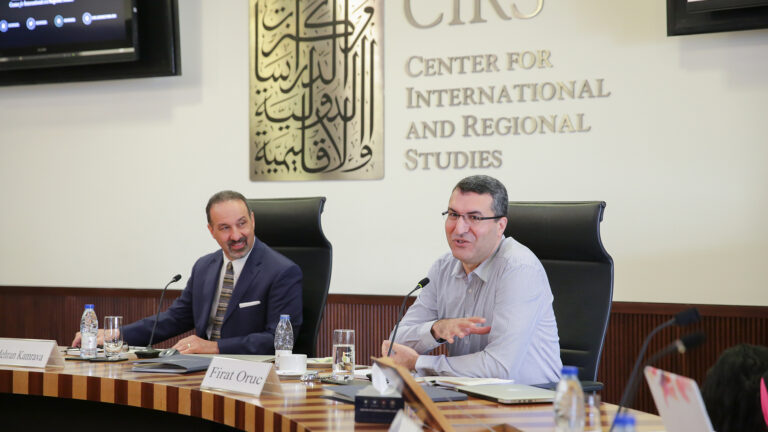CIRS Faculty Research Workshops, Regional Studies
Firat Oruc CIRS Faculty Publication Workshop

On June 10, 2019, CIRS hosted a Faculty Publication Workshop for Firat Oruc, Assistant Professor of English and Humanities at Georgetown University in Qatar, to discuss his forthcoming book Petromodernity and Film: A Cultural History of the Moving Image in the Arabian Peninsula. Several cinema studies scholars were invited to read parts of the manuscript, and to share their critiques with the author and each other during the one-day meeting. The research pivots around a key, yet unanswered, question: in what ways is the moving image a key source for tracing the cultural and political history of the Arabian Peninsula in the aftermath of the discovery of oil? Although film emerged in the last century as one of the most pervasive forms of communication, its social, historical, and cultural role in the early formations of hydrocarbon modernity in the Arabian Peninsula is yet to be explored.
With the recent regional and global rise of the Arabian Peninsula as a financial and political power, the establishment of film industries has been a shared ambition across these countries. As emergent new players in the regional as well as global media landscape, these countries have not yet achieved a commercially successful and globally influential film industry but have begun laying the foundations for a more sustainable cinematic infrastructure. These efforts toward the development of a film industry not only vary from one country to another but also take place on a peculiar terrain, where financial capacity clashes with “cultural conservatism;” the backing of the rentier state with abrupt official interventions; commercial goals with the arthouse model of the festival circuits; and global ambitions with local constraints. This project places the current Gulf cinema phenomenon in a historical context. The historical dimension brings forth important genealogies of film culture that are rooted in the early formations of hydrocarbon modernity in the region.
This project traces the history of film and visual representation in the countries of the Arabian Peninsula—namely, Qatar, Kuwait, the United Arab Emirates, Bahrain, Yemen, Oman, and Saudi Arabia—in six stages: 1) The colonial emergence of cinema in the Arab Gulf in the 1930s under the regulation and monitoring of the British network of administrative personnel; 2) The use of film for publicity and propaganda purposes by the British Empire’s Gulf stations in the 1940s; 3) The production of documentary films by petroleum companies in the 1950s and 60s to represent (make visible) “the magic of oil;” 4) Visual ethnography and expedition films of the Arabian Peninsula by Western travelers, sailors, anthropologists, and archeologists; (5) The use of “militant filmmaking” to support left-leaning popular movements that emerged in the region in the 1960s and 70s; and 6) The emergence of indigenous filmmaking after independence. I argue that the history of the moving image through these stages and beyond offers us an important critical lens to analyze the modern development of Arabian societies and cultures.
The project’s primary objectives: The primary objective of the project is to analyze the historical development film and visual culture in the countries of the Arabian Peninsula; namely, Qatar, Kuwait, the United Arab Emirates, Bahrain, Yemen, Oman, and Saudi Arabia. The project will offer a narrative of the modern development of Arabian societies and cultures through their visual representation.
Scholarly impact: This project will be the first comprehensive study of the history of film and visual culture in the Arabian Peninsula. It will make a unique original contribution to the scholarship on the cultural history of Arabia, on the one hand, and to world cinema studies, on the other. As such, the project promises to be a key reference source for scholars specializing in these fields. The project is also directly relevant to Qatari society and furthers the priorities established in the Qatar National Vision by constructing a visual cultural history of Qatar (along with other Gulf countries).
Expected outcomes of the project: The project is planned as a monograph for publication with Cornell University Press Persian Gulf Studies series.
- To view workshop agenda click here
- To view Participants biographies click here
Participants and Discussants:
- Hend F. Alawadhi, Kuwait University
- Dale Hudson, New York University Abu Dhabi
- Mehran Kamrava, CIRS – Georgetown University in Qatar
- Sheetal Majithia, New York University Abu Dhabi
- Bindu Menon, Delhi University
- Negar Taymoorzadeh, New York University
- Alia Yunis, Zayed University